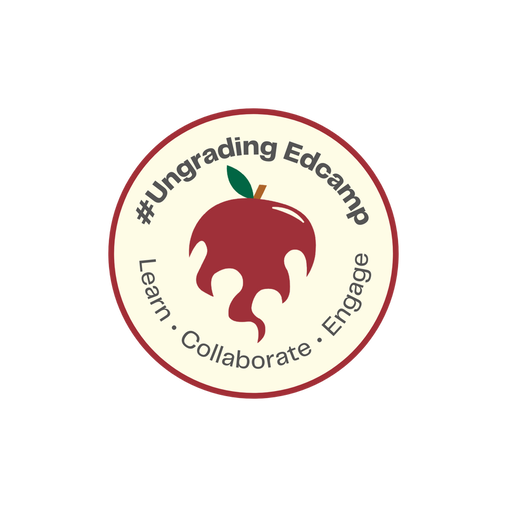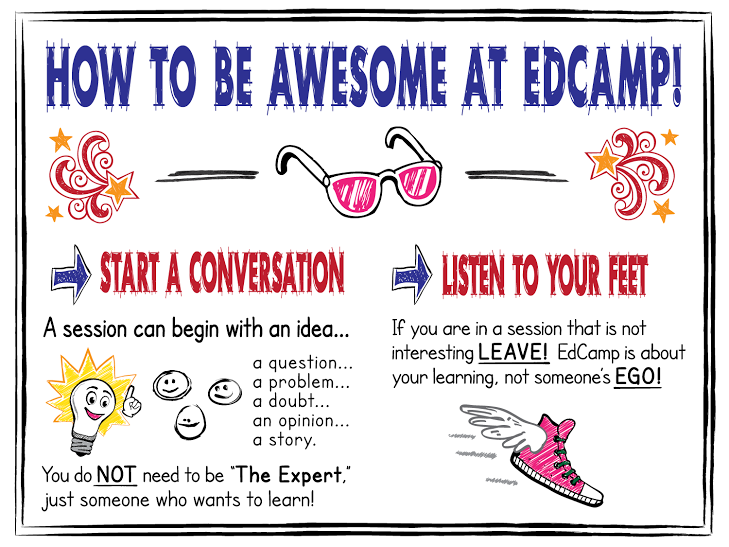Caveat: Most descriptions of Edcamps include what happens in a face-to-face environment. At #Ungrading Edcamp, we'll be turning that narrative on its head to include everything within a virtual setting!
In a nutshell, #Ungrading Edcamp is a way of personalizing our own professional development by focusing on ungrading-related teaching/learning topics which we are most interested in exploring and discussing with our colleagues. It is described as an "unconference" since there is no set presentation schedule or formal presentation format. Instead, the participants of #Ungrading Edcamp will make up the sessions spontaneously; everyone is eligible to lead a session!
Built on principles of connected and participatory learning, #Ungrading Edcamp strives to bring educators together to talk about the things that matter most to them about ungrading's implementation: their interests, passions, and questions. Educators who attend #Ungrading Edcamp can choose to lead sessions on those things that matter, with an expectation that the people in the virtual room will work together to build understanding by sharing their own knowledge and questions. Sessions are participant-driven, encouraging sharing and collaboration among everyone, whether it be a few people or a large group. Educators share their ungrading-related experiences, challenges and passions, each listening for key information to enhance their personalized professional learning. There is no single expert in the room!
In a nutshell, #Ungrading Edcamp is a way of personalizing our own professional development by focusing on ungrading-related teaching/learning topics which we are most interested in exploring and discussing with our colleagues. It is described as an "unconference" since there is no set presentation schedule or formal presentation format. Instead, the participants of #Ungrading Edcamp will make up the sessions spontaneously; everyone is eligible to lead a session!
Built on principles of connected and participatory learning, #Ungrading Edcamp strives to bring educators together to talk about the things that matter most to them about ungrading's implementation: their interests, passions, and questions. Educators who attend #Ungrading Edcamp can choose to lead sessions on those things that matter, with an expectation that the people in the virtual room will work together to build understanding by sharing their own knowledge and questions. Sessions are participant-driven, encouraging sharing and collaboration among everyone, whether it be a few people or a large group. Educators share their ungrading-related experiences, challenges and passions, each listening for key information to enhance their personalized professional learning. There is no single expert in the room!
Article: Why Edcamp?
How does #Ungrading Edcamp work?
- Participants add interesting ungrading-related topics to our Topics Survey.
- Participants organize around shared topics in 60-minute sessions. Anyone can lead or participate in a session.
- Session leaders start the conversation in the chosen virtual space (e.g., Twitter Spaces, Zoom, or Discord).
- No presentation, no PowerPoint, no nothing, except to keep the conversation moving.
- Think about what you have done with ungrading, what you are doing, and what you would like to do. All of this can be shared at #Ungrading Edcamp!
Themes for discussion at #Ungrading Edcamp:
. . . and some potential focal points:
Impact on Educators (professional learning)
Impact on Teaching/Pedagogy
Impact on Learning and Students
- The WHY of #ungrading. This theme involves the motivations to venture into the world of #ungrading.
- The HOW of #ungrading. This theme involves the steps to implement #ungrading, from the novice educator to the expert ungrader.
- The EFFECTS of #ungrading. This theme involves the outcomes (whether on pedagogy or on student learning) of #ungrading experiences.
- The FORCES of #ungrading. This theme involves the power struggle (the ungrader vs. admin, institutional, positional, personal forces) that's created when employing #ungrading.
. . . and some potential focal points:
Impact on Educators (professional learning)
- Motivators, Accessibility, Consistency
- Professional Development
- Value proposition for instructors
Impact on Teaching/Pedagogy
- Characteristics driving usage and implementation
- Perceptions of efficacy
- Pedagogical innovations and care
Impact on Learning and Students
- Deep learning and process-orientation
- Resiliency and empowerment
- Self-efficacy and confidence


